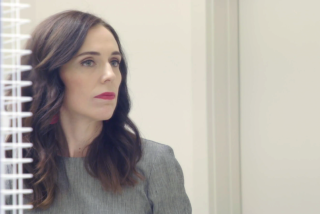‘Ascension’ documentary finds rich stories in China’s economic divide
- Share via
The Times is committed to reviewing theatrical film releases during the COVID-19 pandemic. Because moviegoing carries risks during this time, we remind readers to follow health and safety guidelines as outlined by the Centers for Disease Control and Prevention and local health officials.
Everything we use every day is the product of someone else’s labor. Cellphones and computers, water bottles and plastic cutlery, soap dispensers and blankets are all items in one gigantic interconnected chain of global capitalism that the documentary “Ascension” explores with curiosity, candor and criticism.
Director Jessica Kingdon sets her camera in China, peers behind the curtain of globalism and reveals the universality of worker’s struggles. The result is an enthralling documentary — which received best documentary feature at this year’s Tribeca Film Festival — that spellbindingly heads into myriad corners of China’s increasingly stratified economic classes. Through her unfussy direction and sly editing, Kingdon’s collection of vignettes is a reminder that the destructively frenzied cycle of consumption and waste always trickles down.
The locations and people featured go mostly unnamed. There are no academics or bureaucrats explaining how the Chinese economy works. That lack of specific identification doesn’t make the documentary’s overall effect any less direct. Instead, in its devotion to capturing the gap between the demands of labor and individual reactions to it, “Ascension’s” atmosphere is more impressionistic, more revelatory and more humane.
“Ascension” moves up the economic hierarchy, starting at a kind of job fair where posters advertise the Chinese Dream (“Work hard and all wishes come true”) and company representatives yell out the details of their jobs (“The easiest work you can find: sitting and packing!”). What stands out most, and is the first component of the restrictive world Kingdon constructs, are the many limits imposed by employers upon their employees. “No hair dye!” yells the person hiring for a job whose age cutoff is 38. “Be as non-tattooed as possible,” says another to a curious applicant who admits a small tattoo on their back. And in an ironic twist, a person hiring for a cellphone factory emphasizes, “You cannot bring your personal phone with you to this job.”
The absurdity of that statement is a useful puzzle piece to keep in mind as one watches “Ascension” and absorbs the restraints and demands we are forced to accept and abide by for economic survival. Each scene challenges our blindspots on the things we buy, the brands we trust and the products we use to define ourselves. Once we know how much backbreaking, eye-straining, finger-burning work goes into the detritus with which we clutter our lives, would we still buy all this crap?
Workers complete countless specialized tasks to bring binoculars, fake Christmas trees and jean shorts to market: screwing the eyepieces onto binocular arms, bundling stacks of prickly green faux pine boughs and stamping metal accents into denim waistbands. The rhythm with which they do this is spellbinding, while the arguments workers have with middle managers trying to cheat them out of overtime are enraging (and relatable).
A scene in a sex-doll factory stands out for the contrast between the figures being produced and the professionalism the workers display as they pivot per customer demands regarding nipple color, areola width and pubic hair length. The focus here is how capitalism demands order, efficiency and loyalty at the risk of dehumanization, and Kingdon captures how those rigid demands play out in increasingly ludicrous ways.
“Ascension” then moves upward, spending time in classes on branding and etiquette and at bodyguard and butler schools to capture the Chinese middle class’s aspirational striving, and the portraits are similarly surreal: “After the two-day training, I decided to work to death,” one of the students at a branding seminar proudly proclaims as his long-term goal; “You have to pretend to be obedient,” one of the teachers at the butler school emphasizes to attentive pupils. By the time “Ascension” ends at a European-style dinner held by the very rich people the inhabitants of the documentary’s preceding two segments are theoretically working to please, Kingdon has made her point about the yawning gap between the workers who know struggle and the wealthy who don’t.
“Wealth only goes to whoever deserves it,” one of the rich hosts says, and it’s an appropriately bitter pill to swallow at the end of the enlightening, infuriating and globally relevant “Ascension.”
'Ascension'
Not rated
Running time: 1 hour, 37 minutes
Playing: Starts Oct. 8, Laemmle Monica, Santa Monica; Laemmle Playhouse 7, Pasadena
More to Read
Only good movies
Get the Indie Focus newsletter, Mark Olsen's weekly guide to the world of cinema.
You may occasionally receive promotional content from the Los Angeles Times.








